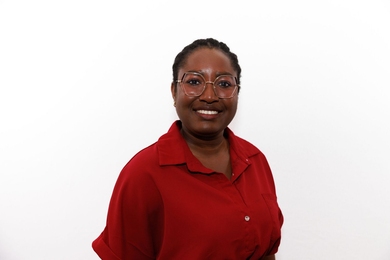Over the course of the spring semester, Tech Talk has brought readers a series of interviews with each of MIT's five school deans. The fourth in this series features Dean David Schmittlein, of the MIT Sloan School of Management. In the following interview with Greg Frost of the MIT News Office, Schmittlein discusses Sloan's engagement with the global community and his hopes for the school's future.
Q: What do you think your biggest challenge will be in coming from the University of Pennsylvania to MIT?
A: My biggest challenge on behalf of this school is to have it fulfill its incredible potential to be not just a leader, but to be the leader, globally, in management education. Further, it can, and must be, the global leader in developing management knowledge that is valuable now and will stand the test of time.
One of the keys to accomplishing that future is deeper and broader and more meaningful engagement with the alumni community, global business community and community of government leaders to be sure we are relevant to what they need from a great school of management now and in years to come.
In that regard, I'm happy that I'm coming on board a moving train: This school has not been static! It has been willing to innovate in creating the portfolio of different educational programs it offers and has also innovated well "inside" each of its programs. It has simply been more responsive than other schools of management to the world's need for different kinds of programs, for different kinds of learners. Undergraduate education in management for the right people. Specialized master's programs, not just the one-size-fits-all, two-year job-switcher MBA. And indeed the MBA, as one important part of that portfolio. The growth in the recent past of the nondegree executive education that the school runs. So we have been willing to experiment with and to maintain a broader portfolio of degree and nondegree programs. The school is positioned to offer the right set of programs for the diverse needs of different kinds of current and future managers in different kinds of organizational settings.
There's also been great innovation inside our programs and I'm very proud of that: A great track of study for entrepreneurship and innovation, better opportunities for global internships and also a focus on this time period's key issues for companies, e.g. sustainability. If you look back 10 years, this was the school that gave people the best head start in answering companies' questions about eCommerce, because every company, whether they were an eCommerce company or not, needed to figure out what to do about electronic commerce. MIT Sloan had then (and has now) more to offer those companies in this regard. And for this time period a similar issue is sustainability. Whether a company is in the "sustainability business" or not it wants incoming management program graduates who have just gone through a thoughtful educational experience to be able to help the organization figure out the key issues of the day, because the people who've been around the organization for 10 or 15 years don't know the current thinking in these new emerging areas.
In other words, that new graduate needs to offer not just expertise in supply-chain management, marketing, finance, etc., but also the firm expects the person to be able to contribute to the transformational business issues of the day. And this school is doing a great job providing its students insights into issues that are transforming economies and business models.
Another piece of that challenge of visibility and engagement is relevance to the world: What is going to make that great aspiring manager who happens to live in Beijing or Singapore or Mumbai or Geneva decide that MIT Sloan is relevant to her or him? We need to start thinking very hard now about the kind of relevance we will have to those folks in the future. In that regard, I'm pleased that this school's approach to global relevance has not been to simply set up a "lemonade stand" in Beijing or Mumbai selling cheap co-branded degrees in conjunction with a local institution or shipping its own faculty in once a month for a quickie MBA, making some money on the side. Instead it has committed itself to deep engagement with organizations that will be, and often are, already the regional leading educational institutions. We help them develop their faculty and organizational leaders through what is sometimes called a "train-the-trainer" model and so achieve a multiplier effect improving the state of management practice regionally. This deep engagement also provides opportunities for MIT Sloan faculty and students to learn more about what business leaders in the region are doing, which is of course crucial to MIT Sloan's own educational and research programs. This particular kind of global engagement is really expensive and it's difficult to sustain, but it is important and is making a material difference in our visibility globally.
Q: It's still early in your tenure, but can you give the MIT community a sense of your top short-, medium- and long-term goals?
A: We need to demonstrate greater engagement with alumni and the broader business community. There are short-term steps to do that--the dean being on the road and also experimenting with new kinds of events where MIT Sloan is a forum and a safe place around which business leaders can gather and so on. We've done some of these things in the past but there is an opportunity to do more, and to experiment with different kinds of activities.
Among the longer-term goals, we need to start building the platforms to tell our own story to the world. We cannot, as a leading school of management, simply rely on the goodwill of editors, or the editorial decisions of the moment for particular magazines and newspapers, to be the main conduit for how people understand us.
With respect to innovation in our educational programs, there are discussions and plans internally to reconsider the particular portfolio of customized offerings from the MIT Sloan school for the world.
Q: You're running the MIT Sloan School of Management, but you're a world-renowned marketing expert. How much of that marketing background do you expect to rely on in this job?
A: Well, I know a lot about specific marketing concepts and methods, about doing surveys and constructing communication programs and so on. But that's not the kind of background that's most important, I think, in this leadership setting. There is however a marketing perspective that starts the whole enterprise's activity with a commitment to understanding the needs of our constituents and for a business school it's not just students, and it's not just faculty, and it's not just alumni, and it's not just business leaders, but it's all those groups. And that commitment goes along with a certain humility, a recognition that we don't necessarily know the answers to what those needs are and that we're willing to listen and we're willing to come to understand our own capabilities, and through the right timeframes to build and change those capabilities, to be relevant to the legitimate needs, the legitimate aspirations of those constituents--those disparate communities. That, fundamentally, is marketing, and is the aspect of my marketing background that I draw on: but it's the "product design" side of marketing, not the "selling the sizzle rather than the steak" side of marketing.
Also, I said earlier that we need to be visible, we need to communicate well and we can do more in those areas if we use a bit of a marketing perspective. Take for example G-Lab, which is a global internship experience for our MBA students. This is a great experience for students: Helping some company in another country and learning about global markets by doing. But frankly every other school has some kind of internship for some kind of student going to some kind of place to do some kind of something. But here's a fact that too many potential MBA students don't know: at this school last year, about half of our students did that, actually did it. And collectively they did it in 17 different countries. Typically at leading schools only a small fraction of students would have such an opportunity and with only a very small number of countries. Frankly, what we're doing here is killing ourselves administratively, managing a program at a large scale, with a great value to our students, that no other school is doing to the best of my knowledge. Yet people don't know about it. MIT Sloan is doing things that we can own in the eyes of the world, that are demonstrable, credible, linked to a real benefit, that no other school either could or would match. I'd rather build a strategy around what we are great at, and can be great at, and that people value, and tell the world about it, than build a strategy around a kind of omnibus survey regarding what people in general say they would like business schools to do, and then somehow claim that we're doing all that stuff.
Q: What is the most surprising thing you've run into so far in your role?
A: The positive engagement of the alumni community, staff, faculty and students, but among those four especially the students. By that I mean the inclination to want to take ownership of the solution of a problem, not just to be the articulator of a problem.
At some other leading schools many of the MBA students fundamentally chose the school for its "brand." Most of our students do not choose us for some fuzzy omnibus B-school brand. They choose us out of a detailed knowledge of who we are and what we offer. And when you have students who have been more thoughtful about why they want to be at a particular place, they are much more likely to be happy and to be engaged in that place. Our students are distinctly engaged--and I celebrate that.
Q: What do you do for fun in your spare time?
A: I love travel, including being exposed to the cultures and peoples of the world. I've just liked that for a very long time. A lot of the remaining leisure time that I have is taken up with my two kids--they're twins, and they're 10 years old. And so there's a lot of fun around the usual stuff that interests 10-year-olds, including sports and music. The children are not a "hobby" of course, but when you put together the desire to be a thoughtful leader of a large organization, and hopefully a thoughtful and engaged parent of a couple kids, those goals soak up the time pretty well.
A version of this article appeared in MIT Tech Talk on May 14, 2008 (download PDF).






